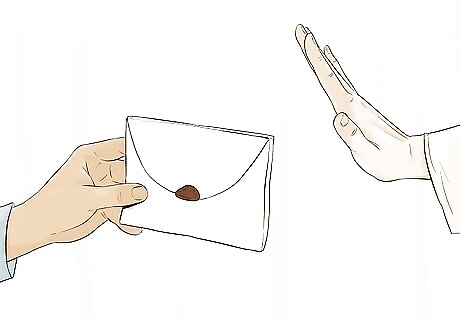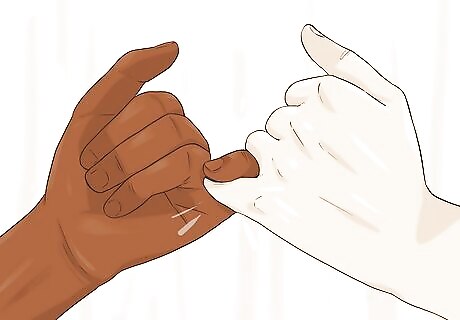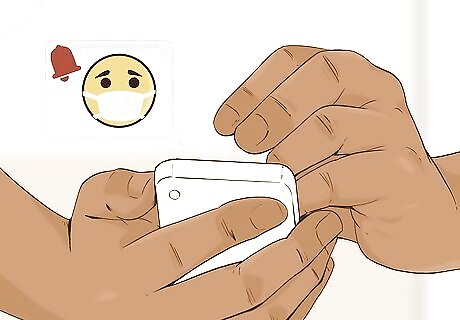
views
Being Honest with the Host

RSVP immediately. Don't put off telling the host that you can't come to the party. Let them know immediately that you can't come, so they don't build up an expectation of your attendance and feel more disappointed when you cancel at the last second.

Deliver the news in person. If the party is important to the host — for example, a birthday party, anniversary party, or baby or wedding shower — it would be rude to just text or email that you can't attend. Find some time to speak to them in person and explain why you can't attend. If you can't speak in person — for example, if the friend lives in a different city, or if your schedules don't match up — make a phone call.

Strike the right tone. People react to disappointing news in different ways, so there’s no single right answer about how to present your news. Depending on the personality of the person you’re breaking the news to, you’ll want to have a different attitude. If you think the person will be offended or sad, be as apologetic as possible. If you think the person will try to pressure or guilt you into attending, be firm.

Give a clear reason for missing the party. If you just tell the host that you don’t “feel” like it, you may hurt their feelings. Giving a specific reason is the best way to go, unless your specific reason is that you don’t like the host! Some examples why you don’t want to attend a specific party might include: You have a previous engagement at that time Someone you would like to avoid is attending the party You have too much work or studying to catch up on

Don't over-explain yourself. When you talk too for too long about why you can't attend a party, you give the host more time to try to convince you that you should attend. Keep that part of the conversation short and sweet, then move on. You might change the topic completely or show that you're still interested in the party by asking about the planning process. Showing interest demonstrates that you wish you could attend, but that you really can't.

Offer to help with the party beforehand. Even if you can't attend the party yourself, you can still help make it a success by offering to lend a hand with the planning and preparation. This will demonstrate to the host that you value their friendship, and that you would attend the party if you possibly could.

Promise to make it up to them. If you have to miss an event, make plans to catch up with the host when you have more time. Make it as close to the event as possible, so you can show an interest in what you missed. This will make the host feel like you appreciate their efforts in throwing the party, and that you value their friendship.

Put in a quick appearance. The best honest way to get out of spending time at a party is to spend the least possible amount of time at the party. Make sure you say hello to the host, so they know you attended. Try to have a good time while you’re there, but let everyone know that you have to leave early. Even if you can’t stay, people will appreciate that you at least made the effort to drop by. If you feel uncomfortable announcing that you have to leave, just slip out without saying goodbye. People will likely be having so much fun, they won't even notice you're gone.
Lying to Get Out of an Engagement

Don’t be too hard on yourself for lying. Studies show that lying is a regular part of daily life even for people we’d otherwise consider moral, upstanding individuals. When people lie to ease social tensions, rather than to serve their own purposes, a white lie might be a better option than the truth.

Keep your lie simple. Lie as little as possible, without elaboration. An elaborate story about why you can’t attend a party will seem suspicious, and will also be more difficult to keep track of if someone asks you about it later.

Blame your family. Everyone understands that familial obligations always trump parties. Tell your friends that you have to babysit a sibling, or that your parents are forcing you to have dinner at your uncle's house that night. An iron-clad excuse is that you're grounded; everyone will understand that there's no way you can come to a party.

Say you already have plans. Only the most overbearing friend would try to guilt you into canceling plans you've already made with someone else to come to their party. But make sure that you don’t use a friend who’s attending the part as your alibi. Say you have plans with a friend from a different school, or even with an imaginary friend.

Pretend you’re not feeling well. On the day of the party, text your friend saying that you think you ate something bad, and that you have food poisoning. Nobody wants someone throwing up at their party. Plus, food poisoning passes very quickly, so nobody can be suspicious when you feel fine again the next day.

Pretend you have too much work to do. Whether you're a student or an adult with a job, everyone knows and understands that sometimes we fall behind and have to catch up on our work. If the host still tries to pressure you into coming, say that your parents or your boss are upset with you, and you have to make it up to them.

Set up your lie ahead of time. If the party is two weeks away, and you know the whole time that you don’t want to attend the party, don’t wait until the last second to get out of it! Set up your lie ahead of time to deflect suspicion. Some things you might consider are: Telling the host at the time of invitation that you have a previous engagement on that day. Telling the host a day or two before the party that you think you’re coming down with an illness.

Keep track of your lie. This is the most thing about lying. Even if the lie is just a little white lie, you don’t want to hurt anyone’s feeling by getting caught. Keep track of exactly what you tell people, and of who you tell it to. If you post the lie on social media to make it more believable, make sure nobody else catches you doing anything else on that night! If you tell the host you’re feeling sick, don’t let anyone tag you in pictures from a different part that night.



















Comments
0 comment